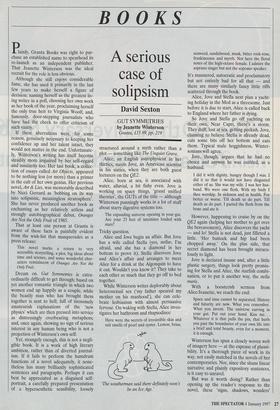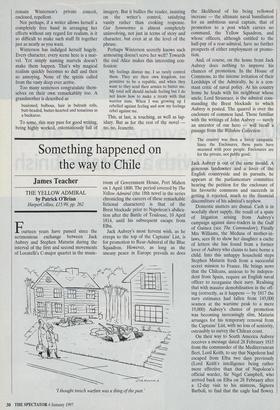BOOKS
A serious case of solipsism
David Sexton
GUT SYMMETRIES by Jeanette Winterson Granta, £15.99, pp. 219 Painly, Granta Books was right to pur- chase an established name to spearhead its re-launch as an independent publisher. That Jeanette Winterson was the ideal recruit for the role is less obvious.
Although she still enjoys considerable fame, she has used it primarily in the last few years to make herself a figure of derision: naming herself as the greatest liv- ing writer in a poll, choosing her own work as her book of the year, proclaiming herself the only true heir to Virginia Woolf, and, famously, door-stepping journalists who have had the cheek to offer criticism of such vanity.
If these aberrations were, for some reason, genuinely necessary to keeping her confidence up and her talent intact, they would not matter in the end. Unfortunate- ly, Winterson's writing has itself become steadily more impaired by her self-regard and insularity too. Her last book, a collec- tion of essays called Art Objects, appeared to be nothing less (or more) than a primer in the cult of her own genius. Her previous novel, Art & Lies, was memorably described by Nicci Gerrard as 'bobbing on its way into solipsistic, meaningless stratosphere'. She has never produced another book as enchanting as her relatively artless and strongly autobiographical debut, Oranges Are Not the Only Fruit of 1985.
That at least one person at Granta is aware of these facts is painfully evident from the wish-list that masquerades as a press release:
This novel marks a return to very accessible storytelling, a plot, big ideas about time and science, and some wonderful char- acters reminiscent of Oranges Are Not the Only Fruit.
Dream on. Gut Symmetries is extra- ordinarily difficult to get through; based on yet another romantic triangle in which two women end up happily as a couple, while the beastly man who has brought them together is sent to hell; full of tiresomely amateurish explanations of the 'new physics' which are then pressed into service as distressingly overbearing metaphors; and, once again, showing no sign of serious interest in any human being who is not a projection of Winterson's own self.
Yet, strangely enough, this is not a negli- gible book. It is a work of high literary ambition, rather than of diverted journal- ism. If it fails to perform the humdrum functions of a novel adequately, it none- theless has many brilliantly sophisticated sentences and paragraphs. Perhaps it can best be appreciated as a disguised self- portrait, a carefully prepared presentation of a hyperaesthetic sensibility, loosely structured around a myth rather than a plot — something like The Unquiet Grave.
Alice, an English astrophysicist in her thirties, meets Jove, an American scientist in his sixties, when they are both guest lecturers on the QE2.
Alice, born at sea, is associated with water, alluvial, a bit fishy even. Jove is working on spacy things, 'grand unified theories', the GUTs of the title — although Winterson punningly works in a lot of stuff about starry digestive systems too.
The expanding universe opening in your gut. Are your 23 feet of intestines loaded with stars?
Tricky question. Alice and Jove begin an affair. But Jove has a wife called Stella (yes, stellar, I'm afraid, and she has a diamond in her bottom to prove it). Stella discovers Jove and Alice's affair and arranges to meet Alice for a drink at the Algonquin to have it out. Wouldn't you know it? They take to each other so much that they go off to bed together. While Winterson writes deplorably about heterosexual sex (`my father speared my mother on his manhood'), she can cele- brate lesbianism with almost persuasive fervour. On waking with Stella, Alice inves- tigates her bathroom and rhapsodises:
Here were the secrets of irresistible skin and salt smells of pearl and oyster. Lemon, brine,
The weatherman said there definitely won't be an Ice Age.'
seaweed, sandalwood, musk, bitter rock-rose, frankincense and myrrh. Not here the floral notes of the high-octave female. I admire the soprano singer but not the soprano speaker.
It's mannered, autocratic and proclamatory but not entirely bad for all that — and there are many similarly fancy little riffs scattered through the book.
Alice, Jove and Stella next plan a yacht- ing holiday in the Med as a threesome. Just before it is due to start, Alice is called back to England where her father is dying.
So Jove and Stella go off yachting on their own. Near Capri, there's a storm. They drift, lost at sea, getting peckish. Jove, claiming to believe Stella is already dead, cuts some bits off her bottom and eats them. Typical male hoggishness, Winter- sonians will agree.
Jove, though, argues that he had no choice and anyway he was entitled, as a husband.
I did it with dignity, hungry though I was. I did it so that it would not have disgusted either of us. She was my wife. I was her hus- band. We were one flesh. With my body I thee worship. In sickness and in health. For better or worse. Till death us do part. Till death us do part. I parted the flesh from the bone and ate it.
However, happening to cruise by on the QE2 again (helping her mother to get over the bereavement), Alice discovers the yacht — and lo! Stella is not dead, just filleted a little. 'Her buttock and hip had been chopped away.' On the plus side, that secret diamond has been brought miracu- lously to light.
Jove is declared insane and, after a little plastic surgery, things look pretty promis- ing for Stella and Alice, the starfish combi- nation, or to put it another way, the stella marls.
With a boosterish sermon from Alice/Jeanette, we reach the end:
Space and time cannot be separated. History and futurity are now. What you remember. What you invent. The universe curving in your gut. Put out your hand. Kiss me... Whatever it is that pulls the pin, that hurls you past the boundaries of your own life into a brief and total beauty, even for a moment, it is enough.
Winterson has spun a closely woven web of imagery here — at the expense of plausi- bility. It's a thorough piece of work in its way, not easily matched in the novels of her contemporaries. Nor, since she shuns linear narrative and plainly expository sentences, is it easy to unravel.
But was it worth doing? Rather than opening up the reader's response to the novel, these 'signs, shadows, wonders' remain Winterson's private conceit, enclosed, repellent.
Nor perhaps, if a writer allows herself a completely free hand in arranging her effects without any regard for realism, is it so difficult to make such stuff fit together just as neatly as you want.
Winterson has indulged herself hugely. Every character, every scene here is a mar- vel. Yet simply naming marvels doesn't make them happen. That's why magical realism quickly becomes so dull and then so annoying. None of the spirits called from the vasty deep ever arrive.
Too many sentences congratulate them- selves on their own remarkablity too. A grandmother is described as
bunioned, bulbous, hair in bulrush rolls, butt-headed, butter-hearted and tenacious as a buckaroo.
To some, this may pass for good writing, being highly worked, ostentatiously full of imagery. But it bullies the reader, insisting on the writer's control, satisfying vanity rather than evoking response. Gut Symmetries is almost completely uninvolving, not just in terms of story and character, but even at at the level of the phrase.
Perhaps Winterson secretly knows such armouring doesn't serve her well? Towards the end Alice makes this interesting con- fession:
My feelings dismay me. I so rarely control them. They are their own kingdom, too primitive to be a republic, and when they want to they send their armies to batter me. My total self should include feeling but I do not know how to make a treaty with that warrior state. When I was growing up I rebelled against feeling and now my feelings rebel against me.
This, at last, is touching, as well as lap- idary. But as for the rest of the novel no, no, Jeanette.



























































 Previous page
Previous page